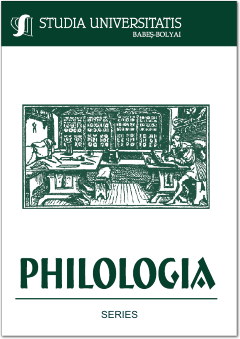OBSERVATIONS ON THE MORPHEMATIC STATUS AND ON THE PARSING OF THE ROMANIAN FINAL VOWEL –Ă IN COMMON NOUNS FORMED THROUGH MOTIONAL DERIVATION
OBSERVATIONS ON THE MORPHEMATIC STATUS AND ON THE PARSING OF THE ROMANIAN FINAL VOWEL –Ă IN COMMON NOUNS FORMED THROUGH MOTIONAL DERIVATION
Author(s): Diana-Maria RomanSubject(s): Morphology, Lexis
Published by: Studia Universitatis Babes-Bolyai
Keywords: morphematic status; motional derivation; lexical-grammatical morpheme; parsing; derivational suffix; flective; root; radical;
Summary/Abstract: Observations on the Morphematic Status and on the Parsing of the Romanian Final Vowel –ă in Common Nouns Formed through Motional Derivation. This study represents the result of research on the morphology of the contemporary Romanian language and concerns the situations in which the final vowel –ă appears in the flexible lexical-grammatical classes specific to this language system. It focuses, in particular, on primary common nouns and on common nouns formed through motional derivation. In all of these cases, the morphematic category of –ă has been determined. As regards the nouns obtained through motional derivation, in order to ensure the compatibility between its morphematic status and the parsing of the lexemes in which the final vowel –ă appears, only one of three possible parsing versions has been chosen as valid. In the case of the other two, the ones “not accepted”, their “procedural errors” have been highlighted. This study has proved that, in the class of common nouns, there are two instances of motional derivation in which -ă appears at the end of the lexemes, bearing the common name of a lexical-grammatical morpheme: when this speech segment is both a derivational suffix and a desinence-flective, coinciding with both throughout its entire length; when the same speech segment is both an allomorph of the derivational suffix and a desinence-flective, coinciding only with the flective throughout its entire length. Thus, in these contexts, by simultaneously focusing on the morphematic status and on parsing, we have reached the conclusion that: at the level of the name, the final -ă plays a cumulative role, as it cumulates two opposable types of content, namely lexical and grammatical, while at the speech level, it plays a decumulative role, the final vowel -ă being forced to occur in both positions in parsing: to the left, next to the root, as a motionally derived suffix, and to the right, as a desinence-flective, so as to do justice to this name.
Journal: Studia Universitatis Babes-Bolyai - Philologia
- Issue Year: 65/2020
- Issue No: 1
- Page Range: 243-261
- Page Count: 19
- Language: English

